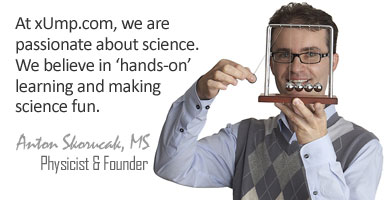-
SHOP BY DEPARTMENT
- Toys & Gifts
- Science Desktop Gadgets and Toys
- Fidgets and Stress Relievers
- Science Meets Art
- Yo-Yos & Gyroscopes
- Remote Control RC Toys
- Glow-in-the-Dark
- Lighting
- Clocks and Watches
- Dinosaur Toys
- Sea Monkeys Kits
- Kaleidoscopes
- Science T-Shirts
- Outdoor Fun
- Balls
- Balloons & Bubbles
- Slime and Putty
- Gags, Pranks & Magic
- Science Mugs
- Pens & Stationery
- Creative Corporate Gifts
- Inflatables
- Edible Science
- Keychains & Bracelets
- Science Party Supplies
- Gift Sets
- Toys & Gifts
- Science Kits
- Mini DIY STEM Kits
- Thames & Kosmos Kits
- Building Kits
- Physics Kits
- Chemistry Sets
- Astronomy & Space Kits
- Plants & Growing Kits
- Animal & Insect Kits
- Human Body Kits
- Geology & Dig Kits
- Math Kits & More
- Forensic Science Kits
- 4M Science Kits
- Crystal Growing Kits
- Alternative Energy Kits
- General Science Kits
- Weather Kits
- Science Kits
- Robotics & Electronics
- Robots & Kits
- Electronics Sets
- Components
- Connectors, Wire & Switches
- Light Bulbs & Holders
- Soldering Tools & Supplies
- Small Hobby DC Motors
- Test & Measurement
- Tools
- Battery Holders
- Batteries, Adapters & Power Supplies
- Lithium Batteries
- USB Power & Accessories
- Boxes & Enclosures
- Arduino & LilyPad
- Robotics & Electronics
- Magnets
- Bar and Block Magnets
- Horseshoe Magnets
- Disk and Ring Magnets
- Mag Marbles and Rocks
- Flexible Magnets
- Iron Filings and Shapes
- Ceramic Magnets
- AlNiCo Magnets
- Neodymium Magnets
- Compasses
- Electro-Magnets
- Letters, Numbers, etc.
- Magnet Kits
- Classroom Magnet Kits
- Fridge Magnets
- Magnet Toys & Puzzles
- Other Magnets
- Magnets
- Optics & Lasers
- Microscopes
- Telescopes
- Solar Cells & More
- Lab Supplies
- Fossils & Rocks
- Globes
- Puzzles & Games
- Books & Study Charts
- Go Green Stuff
- Survival & Safety Products
- Toys & Gifts
- NEW & POPULAR
-
BY AGE & PRICE
- ON SALE
10 Ways to Keep Your Kids Interested In Science
by xUmp.com Science Staff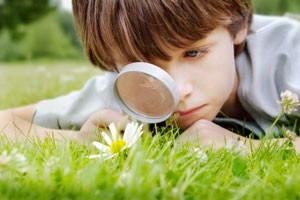 Young children are natural scientists: they ask questions, pick up sticks and bugs outside, and are curious about the world around them. But as they get a bit older, many kids gradually lose their interest in science. They might see it as just another task at school, something that doesn't apply to their lives. Of course nothing could be further from the truth, so here are ten ways you can remind your kids that science is everywhere. Most of these are fun for adults, too!
Young children are natural scientists: they ask questions, pick up sticks and bugs outside, and are curious about the world around them. But as they get a bit older, many kids gradually lose their interest in science. They might see it as just another task at school, something that doesn't apply to their lives. Of course nothing could be further from the truth, so here are ten ways you can remind your kids that science is everywhere. Most of these are fun for adults, too!
1. Use a microscope.
Go out to a body of water and safely collect samples of plant, animal, or ground material and bring them home to let your kids look at them through the lens of a microscope. They'll be amazed at what they see. Get them thinking about why certain plants and animals are only found in certain places. For example, they might see amoeba wiggling around in pond water, or see the fine detail in the wing of a dead insect, prompting a discussion about how different organisms move around. If you don't have a standard microscope, inexpensive ($10-$20) pocket microscopes and magnifying glasses can be purchased online, and standard microscope prices are dropping all the time.
2. Find science camps in your area.
Camps are great ways for your child to explore the science while interacting with other children. These camps provide hands-on learning opportunities that make science fun. One of the most famous is Space Camp in Alabama, but there are other types of science camps around the world, run by many different organisations. If you don't know where to start looking, a local university might be able to help: some run their own science camps, and others might have outreach offices who can recommend a camp. During the school year, you could enroll your child in a science tutoring program or after-school science workshop. Check with your child's school, local park, community center, or aquarium. Each of these may hold a program.
3. Visit a natural history museum or science center.
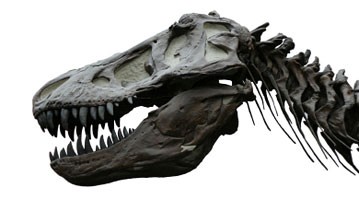 You can find a natural history museum or science center in most major cities. In general, natural history museums have a strong focus on ecology, geology, paleontology, and sometimes anthropology. Science centers often cover a broad area, and include all sciences. Some bigger science centres also have IMAX cinemas, where you might catch a 3D science documentary. Both types of museums may feature unique interactive experiments geared toward both children and adults. Best of all, many of these centers are free or inexpensive relative to most other forms of entertainment.
You can find a natural history museum or science center in most major cities. In general, natural history museums have a strong focus on ecology, geology, paleontology, and sometimes anthropology. Science centers often cover a broad area, and include all sciences. Some bigger science centres also have IMAX cinemas, where you might catch a 3D science documentary. Both types of museums may feature unique interactive experiments geared toward both children and adults. Best of all, many of these centers are free or inexpensive relative to most other forms of entertainment.
4. Watch a movie.
Although the bulk of popular movies tend to be pretty mindless, you can bet there will be at least one blockbuster sci-fi flick released that is grounded to some extent in real science. Such films are learning opportunities for children, especially if there's erroneous pseudoscience mixed in with the verifiable facts. Asking your child to try to differentiate between the two allows them to apply critical thinking to something they enjoy. Ask your child if processes and phenomena in the film are possible given what they know about science. Can we really hear explosions in outer space? How are Spiderman's abilities similar to those of a spider? Look up these processes on the internet and learn for yourself what is fact and what is fiction so that you can help guide and stimulate your kid's thinking.

5. Take a hike.
A long walk through nature provides a terrific opportunity to talk about science with your child. You can discuss a wide range of topics such as animal habitats, photosynthesis, the changing of the seasons, predator-prey relationships, and local geology. Take a camera along to photograph interesting things you see. Can you identify all the trees, plants, insects and birds? If not, take a picture, and try to identify the species when you're back home. You can even bring a magnifying glass and compass along. Plus you and your child will enjoy the fresh air and get some exercise.
6. Become a citizen scientist.
Some research projects need a lot of hands and eyes to collect and analyse all the data. Anyone can become a "citizen scientist" and take part in these projects, and a lot of projects even require participants to live in a wide variety of locations. Projects vary from collecting samples of local plants or insects to identifying and sorting through pictures of animals or images from space. There are always new projects popping up, and the researchers who run the projects will often keep participants up to date on what they discovered. It's an opportunity to help out real scientists.
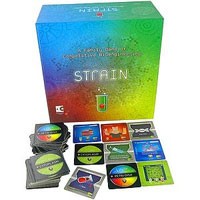
7. Play games.
Somewhat related to citizen science is a game called Foldit, which lets people play games to help biochemists with scientific calculations. Some of the top Foldit players are kids - and their game results help improve biomedical research! Not all science games are so directly related to research, but there are a lot of games (both online games and board games) based on science. For example, in the board game Strain players evolve, adapt and outsmart to build the mightiest micro-organisms. The game is fun to play, and it sparks discussion about micro-biology.
8. Turn your kitchen into a lab.
Your kitchen is a handy place for staging simple but engaging science experiments. A quick web search for "kitchen science experiments" will yield a treasure trove of different fun experiments. Making a volcano out of baking soda and vinegar is a classic, but you can also use items from your kitchen to build a model demonstrating how trains turn corners, or to extract DNA from fruit. Most of the materials required for each experiment can be found in your own cabinet or be purchased for a small price at your local grocery store.
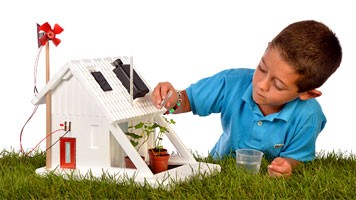
9. Get a science kit.
For more involved experiments, you can find a great selection of science kits. These kits tend to be relatively inexpensive and typically include all the materials required to perform each experiment. There is a science kit for nearly every discipline, such as astronomy, physics, optics, chemistry, biology, human anatomy, forensic science and geology. In addition, a science kit is an excellent barometer for gauging your child's interests in certain discipline.
10. Learn with your kids.
The most important thing to remember is that science is all around us, informing our lives, controlling the natural occurrences and mechanical bodies with which we interact every day. This means that everything you see, smell, touch, taste or hear is an opportunity for scientific inquiry. Encourage your child to ask questions. What causes rainbows? What makes balloons float? You may not know the answer, but you can both find the answer together. Reflect on the fact that our universe and life are miracles, that there is a cause for every effect, that science touches every aspect of life. Teach your child the joy of learning how the world works.
Additional Online Resouces:
- Locate near science centers (international list)
- Find a Summer Science Camp
- The 10 most (and least) accurate sci-fi movies
- Find citizen science projects at SciStarter or Zooniverse
- Foldit and an article about Foldit
- The Naked Scientists' Kitchen Science Experiments
- A father made animal camera traps with his kid to look at backyard animals: Animal Detector










